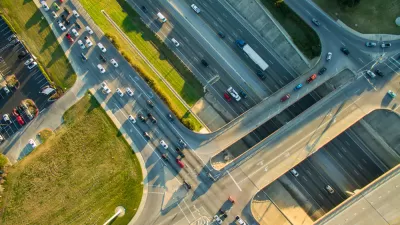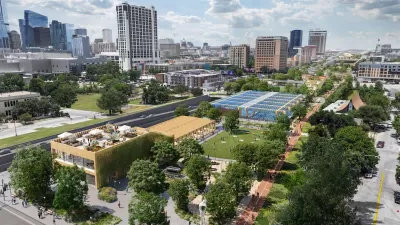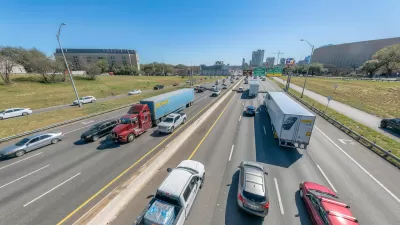In addition to new HOV lanes and a proposed boardwalk, TxDOT agreed to engineer the freeway for caps in some areas, but the city would have to fund their construction.

A letter sent by Austin mayor Kirk Watson to opponents of a freeway widening project outlines proposed changes to the Texas Department of Transportation (TxDOT)’s Interstate 35 expansion plan, which is being opposed by resident groups and some local officials.
According to an article by Nathan Bernier for KUT, “Adjustments to the once-in-a-generation project include the possibility of covering larger sections of the highway north of downtown, constructing a $25 million boardwalk on Lady Bird Lake and filtering stormwater runoff into the Colorado River.”
Bernier adds, “TxDOT's transformation plans include lowering the main lanes for much of the distance between Oltorf Street and Airport Boulevard. The City of Austin hopes to cover these lowered portions of the highway with "caps" — basically large decks — that could support buildings at least two stories tall. TxDOT won't pay for the caps, but will engineer the highway to allow for their installation.” The agency has agreed to lower a third portion to make way for a cap.
As part of the project, “TxDOT is set to construct a near half-billion-dollar drainage system, which includes a tunnel under Cesar Chavez Street that would direct stormwater runoff into the Colorado River near U.S. 183.” But according to the city’s Watershed Protection Department, “The current design would not have the capacity to treat all stormwater runoff.”
The article details other parts of the TxDOT plan, such as new high occupancy vehicle (HOV) lanes and the $25 million boardwalk along Lady Bird Lake that would replace other parkland that will be lost to the project. The expansion has faced staunch opposition from local residents, including three city council members, from the start.
FULL STORY: Austin's I-35 plans revised to include new cap and a $25 million boardwalk

Alabama: Trump Terminates Settlements for Black Communities Harmed By Raw Sewage
Trump deemed the landmark civil rights agreement “illegal DEI and environmental justice policy.”

Study: Maui’s Plan to Convert Vacation Rentals to Long-Term Housing Could Cause Nearly $1 Billion Economic Loss
The plan would reduce visitor accommodation by 25% resulting in 1,900 jobs lost.

Why Should We Subsidize Public Transportation?
Many public transit agencies face financial stress due to rising costs, declining fare revenue, and declining subsidies. Transit advocates must provide a strong business case for increasing public transit funding.

Paris Bike Boom Leads to Steep Drop in Air Pollution
The French city’s air quality has improved dramatically in the past 20 years, coinciding with a growth in cycling.

Why Housing Costs More to Build in California Than in Texas
Hard costs like labor and materials combined with ‘soft’ costs such as permitting make building in the San Francisco Bay Area almost three times as costly as in Texas cities.

San Diego County Sees a Rise in Urban Coyotes
San Diego County experiences a rise in urban coyotes, as sightings become prevalent throughout its urban neighbourhoods and surrounding areas.
Urban Design for Planners 1: Software Tools
This six-course series explores essential urban design concepts using open source software and equips planners with the tools they need to participate fully in the urban design process.
Planning for Universal Design
Learn the tools for implementing Universal Design in planning regulations.
Smith Gee Studio
Alamo Area Metropolitan Planning Organization
City of Santa Clarita
Institute for Housing and Urban Development Studies (IHS)
City of Grandview
Harvard GSD Executive Education
Toledo-Lucas County Plan Commissions
Salt Lake City
NYU Wagner Graduate School of Public Service





























